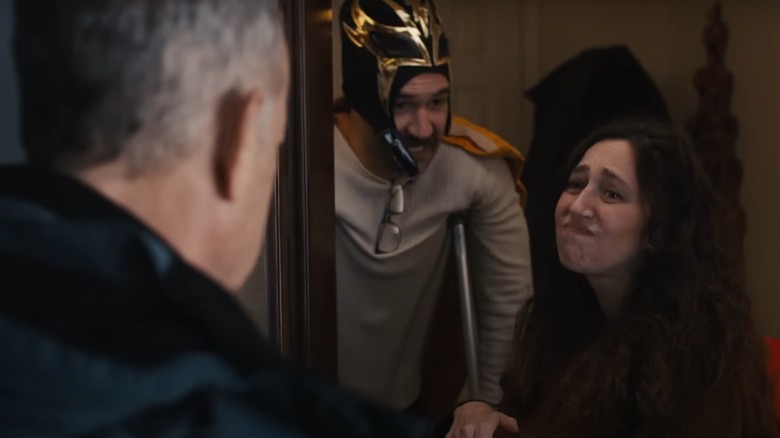
Warning: This review contains spoilers for "A Man Called Otto," as well as sensitive, potentially triggering content.
In Tom Hanks' wildly varied film career, he's played everything from a lawyer dying of AIDS ("Philadelphia") to a shopkeeper in love ("Sleepless In Seattle") to an unlikely influencer of history ("Forrest Gump"). He's even starred in a very informal plane crash trilogy, as a pilot stuck landing a crashing plane ("Sully"), a man stuck on an island after a plane crash ("Cast Away"), and a man stuck in an airport after a plane landing ("The Terminal"). In "A Man Called Otto," based on the 2012 Fredrik Backman novel "A Man Called Ove" and the 2015 Swedish film of that same title, Tom Hanks takes on his least characteristic role yet: that of a grumpy old widower.
It's an interesting project to save the least, given its dedicated attempt to land charming, family-friendly vibes against a narrative that relies on a widower fed up with living without his beloved Sonya (Rachel Keller). It joins the company of Redeemed Cranky Old Men films, and one can't help but be continually reminded of, say, "As Good As It Gets" and "Gran Torino" as it proceeds. What distinguishes this film from those is the peculiarity of Otto's unique challenge, one that's so core to its story that this review will have to get into spoiler territory to discuss it.
Fair warning ahead, we're going to be discussing both MAJOR SPOILERS and an extremely sensitive topic.
Otto, we come to find out, is so distraught over his wife's death that he aims to join her in the afterlife by committing suicide. Distraught, suicidal commitment has been well handled before in films that don't aim for a tragic tone, like Frank Capra's holiday classic "It's A Wonderful Life" and Billy Wilder's "The Apartment." "A Man Called Otto" attempts to join that list, with talented performers and a number of enjoyable moments, but its woefully uneven tone and odd handling of such a serious issue keep it from meeting its potential.
A Serious Topic Anchored By Strong Performances

"A Man Called Otto" begins with a man buying rope in a hardware store. That man is widowed retiree Otto (Tom Hanks), and he is particular about both his rope length and, well, everything else — he separates the trash and recyclables, enforces parking rules, and keeps the i's dotted and the t's crossed in his nice but gentrifying neighborhood. And Otto does this all with a frown on his face. Otto is the neighborhood grump, and after his wife Sonya's death he largely keeps to himself ... at least until new neighbor Marisol (an electric Mariana Treviño) and her charming family move in and need a little help. It's the first in a series of interruptions that peel off Otto's prickly edges and allow him to grow and let the love in, finding connection in the power of community.
Unfortunately, Much of the film is a series of interruptions. Otto tries a method of suicide, fails or is interrupted by a needy neighbor, he begrudgingly helps said neighbor, and so on, as his grieving heart is progressively warmed by Marisol and co., a mangy cat he begrudgingly takes in, and others in his little gentrifying neighborhood. Where "Otto" most excels is in its performances. Tom Hanks has appropriate complexity as the widowed curmudgeon, boasting considerably strong emotional moments alongside showcasing the comedic chops he used more heavily in his early career. Some of his strongest performances are interrupted by oddly spliced-in and transitioned memories, but he still lands them well enough that his Otto is routinely enjoyable to watch.
The surrounding cast here largely also do a wonderful job with their respective roles. Mariana Treviño gives an exceptional performance as Marisol, full of heart and fire and tremendous on-screen charisma. Rachel Keller brings a lot of warmth and humanity to her all-too-brief scenes as the younger version of Otto's wife ... though one can't help but wonder why Otto's remembrances of his beloved wife never extend beyond her early days. One would think he'd remember more than a brief, years-ago span in the life of a woman he loved so much he'd die to join, but alas ... evidently not. It's a curious omission to say the least. Together the performances drive a movie full of moments that are enjoyable when abstracted from their context. It's engaging to watch these players interact and to see Otto's transition over the movie's runtime.
A Decent Movie Hampered By Tonal Inconsistencies

Beyond the performances, a lot of other elements work in how the tale of "A Man Called Otto" is told. A number of comedic moments work well, driven largely by Hanks' irascible Otto being ornery in the moment. A good part of it is a comedy of little errors, where his low tolerance for things like parking violations and interruption are played for laughs, and these scenes typically work well. Also successfully played for laughs are a number of moments where Otto's ultimate good nature forces him time and again to help a neighbor or former friend despite his desire to be left alone ... a sort of aged Mad Max traversing the desert of his lonely life until he's begrudgingly forced to be something beyond a jerk. Largely these moments land, and it's this journey of accidental reconnections that more often than not bring home an engaging story about a heartbroken man reclaimed through the power of community.
That said, there are a number of elements and moments that don't quite fit in "A Man Called Otto." Plenty of individual jokes land, scenes work, but one can't help but find a tonal dissonance between the subject matter and its treatment. At its core, it's a film about a distraught man who wants to commit suicide after the death of his beloved wife until he finds a new makeshift family. Throughout the film he repeatedly tries new ways to kill himself, each time getting ironically interrupted by this or that neighborly need or accident.
When one thinks about it, this material is heavy. One would expect a drama or black comedy, but director Marc Forster pulls out all the stops to maintain a superficially family-friendly, heartwarming tone. Attempts are played for laughs as the narrative winds its way from one attempt to another, sandwiched around enough warm moments and cutesy interludes that the audience can forget how dark the material is. It feels odd each time we watch a distraught man's attempted suicide be played off for a quirky laugh, judo'ed into a heartwarming tale of a man's social re-creation. It makes for a confusing tonal mishmash, and it isn't until Otto's abrupt admission at the end that the movie ever seems to take that element of the story seriously.
Adding to these issues is a film score that rarely works or matches the scene appropriately. At times, it feels like music that belongs in a television movie rather than in the newest outing of a seasoned performer like Hanks. Altogether, the score and original songs rarely fit the film and contribute to its relative inability to land on a coherent feeling or balance its humorous and dramatic emotional pulls. "A Man Called Otto" has its moments, both humorous and heartwarming, and it works better than it should due to the strength of its performances. Unfortunately, it's also plagued by choices that blunt its overall coherence, seeming like Forster wanted to make an entirely different kind of film than the material dictated.
/Film Rating: 7 out of 10
(If you or a loved one are a survivor of suicide, or have had suicidal ideations of any kind, please consider reaching out to a medical professional, or call the National Suicide Prevention Lifeline at 1-800-273-8255.)
Read this next: The Best Movies Of 2022 So Far
The post A Man Called Otto Review: A Charming Film Held Back by Odd Tonal Decisions appeared first on /Film.
0 Commentaires